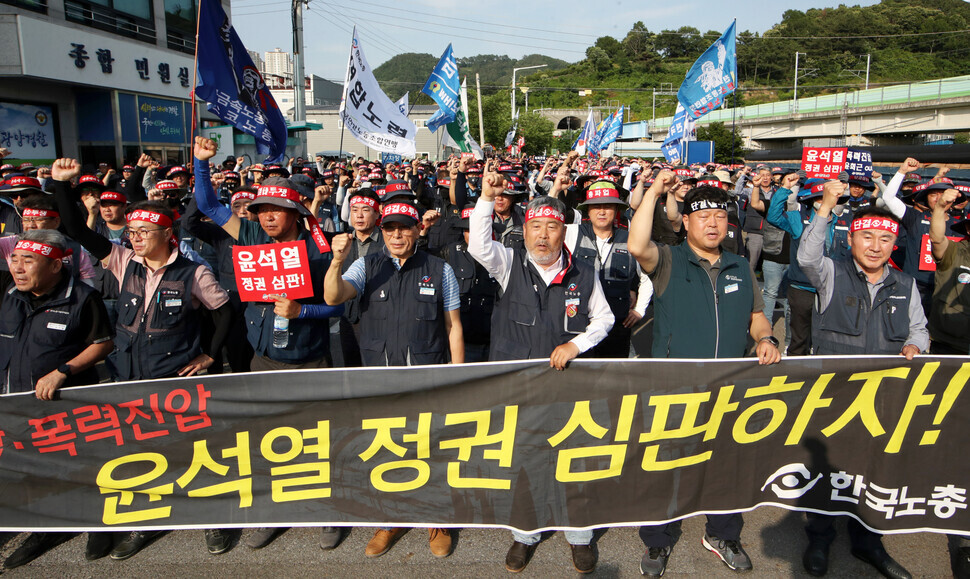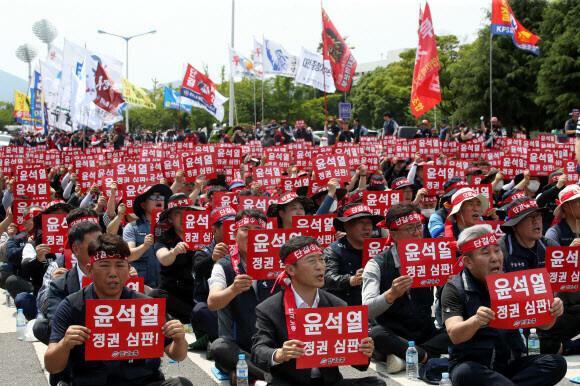hankyoreh
Links to other country sites 다른 나라 사이트 링크
Union-bashing results in severance of labor-government dialogue in Korea

Another long-term vacuum of social dialogue appears to lie in store after the decision by the Federation of Korean Trade Unions (FKTU) on Wednesday to suspend all such dialogue activities within the Economic, Social and Labor Council (ESLC) framework.
Amid an up-and-down history since 1998, the FKTU has shouldered social dialogue responsibilities between the two confederations, the other of which is the Korean Confederation of Trade Unions (KCTU).
It is the first time in seven years and five months that the FKTU has declared a halt to its social dialogue activities.
Announcing plans to “pass judgment on the Yoon Suk-yeol administration,” the federation is also set to hold discussions on leaving the ESLC — meaning that the administration will have to pursue labor reforms through its own capabilities for the time being.
At an ad hoc meeting of its central executive committee on Wednesday at its regional chapter in Gwangyang, South Jeolla Province, the FKTU decided to suspend its participation in social dialogue through the ESLC framework.
In addition to halting dialogue, it also plans to discuss leaving the ESLC altogether. The same day, the committee agreed to entrust its president, King Dong-myeong, and the rest of the FKTU leadership with authority to decide on whether to pull out of the ESLC.
The FKTU’s decision on Wednesday was limited solely to dialogue based on the ESLC framework and does not mean it will stop taking part as a workers’ and members’ representative in other government commissions, including the Minimum Wage Commission and the National Pension Service Investment Management Commission.
In January 2016, during the Park Geun-hye administration, the FKTU declared a boycott of the Economic and Social Development Commission of Korea (the ESLC’s predecessor) in protest of the pursuit of two major guideline initiatives that included the dismissal of workers with low performance. The federation ended up rejoining the central social dialogue framework after the commission was revised into the ESLC in 2018.

Even with labor-government relations souring since the Yoon administration took office, the FKTU had remained circumspect about declaring an ESLC boycott.
In an interview with the Hankyoreh last February, Kim Dong-myeong said, “I believe social dialogue is still an effective way of resolving conflict in our society. We don’t want to take breaking things off lightly.”
But amid these efforts to keep dialogue going, the straw that broke the camel’s back was the police’s use of aggressive tactics against Federation of Korean Metalworkers’ Trade Unions president Kim Man-jae and secretary-general Kim Jun-yeong at the scene of a protest by workers with the POSCO Gwangyang steel plant’s subcontractor Poun in Gwangju on May 30 and 31.
Kim Jun-yeong in particular was left bleeding from blows with police batons as he was forcibly dragged from a tower at the occupation site and arrested.
Some analysts said the situation was always in the cards after the administration’s decision to favor the use of force over dialogue in its relations with organized labor.
“The administration hasn’t shown any intention at all of using social dialogue as a key steppingstone for its labor policy,” said Park Tae-ju, a research professor at the Korea University Institute for Research on Labor and Employment and former ESLC standing committee member.
“Social dialogue isn’t possible in an environment where the very agenda of ‘labor reform’ is unclear and most of the content consists of policies that exclude the labor unions,” he explained.
To date, the administration has unilaterally declared its labor reforms to include the submission of labor union accounting ledger information, exclusion from state subsidies, and redefinition of working hours. In the process, it has been butting heads with both the FKTU and the KCTU.
“This situation was brought about by the Yoon Suk-yeol administration’s nature and identity with its deep-rooted hatred of unions and its political calculations and chicanery,” Kim Dong-myeong said Wednesday.
With the FKTU no longer taking part in the ESLC, analysts are predicting the administration’s already floundering labor policies will lose even more momentum.
“These labor policies are unlikely to gain much steam through the government’s commitment alone when even the FKTU, which had at least been proactive about social dialogue, is no longer taking part in the discussions,” predicted Bae Kiu-sik, a former ESLC standing committee member and Korea Labor Institute president.
“Our social dialogue framework is still inadequate, but it had been gradually establishing itself in 1998,” he added. “Now it’s in crisis once again.”
By Bang Jun-ho, staff reporter
Please direct questions or comments to [english@hani.co.kr]

Editorial・opinion
![[Column] The state is back — but is it in business? [Column] The state is back — but is it in business?](https://flexible.img.hani.co.kr/flexible/normal/500/300/imgdb/original/2024/0506/8217149564092725.jpg) [Column] The state is back — but is it in business?
[Column] The state is back — but is it in business?![[Column] Life on our Trisolaris [Column] Life on our Trisolaris](https://flexible.img.hani.co.kr/flexible/normal/500/300/imgdb/original/2024/0505/4817148682278544.jpg) [Column] Life on our Trisolaris
[Column] Life on our Trisolaris- [Editorial] Penalties for airing allegations against Korea’s first lady endanger free press
- [Editorial] Yoon must halt procurement of SM-3 interceptor missiles
- [Guest essay] Maybe Korea’s rapid population decline is an opportunity, not a crisis
- [Column] Can Yoon steer diplomacy with Russia, China back on track?
- [Column] Season 2 of special prosecutor probe may be coming to Korea soon
- [Column] Park Geun-hye déjà vu in Yoon Suk-yeol
- [Editorial] New weight of N. Korea’s nuclear threats makes dialogue all the more urgent
- [Guest essay] The real reason Korea’s new right wants to dub Rhee a founding father
Most viewed articles
- 1[Column] Why Korea’s hard right is fated to lose
- 2[Column] The state is back — but is it in business?
- 360% of young Koreans see no need to have kids after marriage
- 4Amid US-China clash, Korea must remember its failures in the 19th century, advises scholar
- 5[Reporter’s notebook] In Min’s world, she’s the artist — and NewJeans is her art
- 6[Column] Life on our Trisolaris
- 7[Reportage] New funeral culture taking hold in South Korea
- 8S. Korean chaebols comprise 84% of GDP but only 10% of jobs
- 9Japan says it’s not pressuring Naver to sell Line, but Korean insiders say otherwise
- 10Another chaebol heir caught smuggling liquid marijuana into South Korea